Roshen Chanaka Ratnasekera, a 21-year-old employee from the Katunayake Free Trade Zone (FTZ), died on Wednesday from police gunshot wounds. More than 200 workers were injured when police attacked a FTZ protest on Monday using water cannon, tear gas and batons and live rounds.
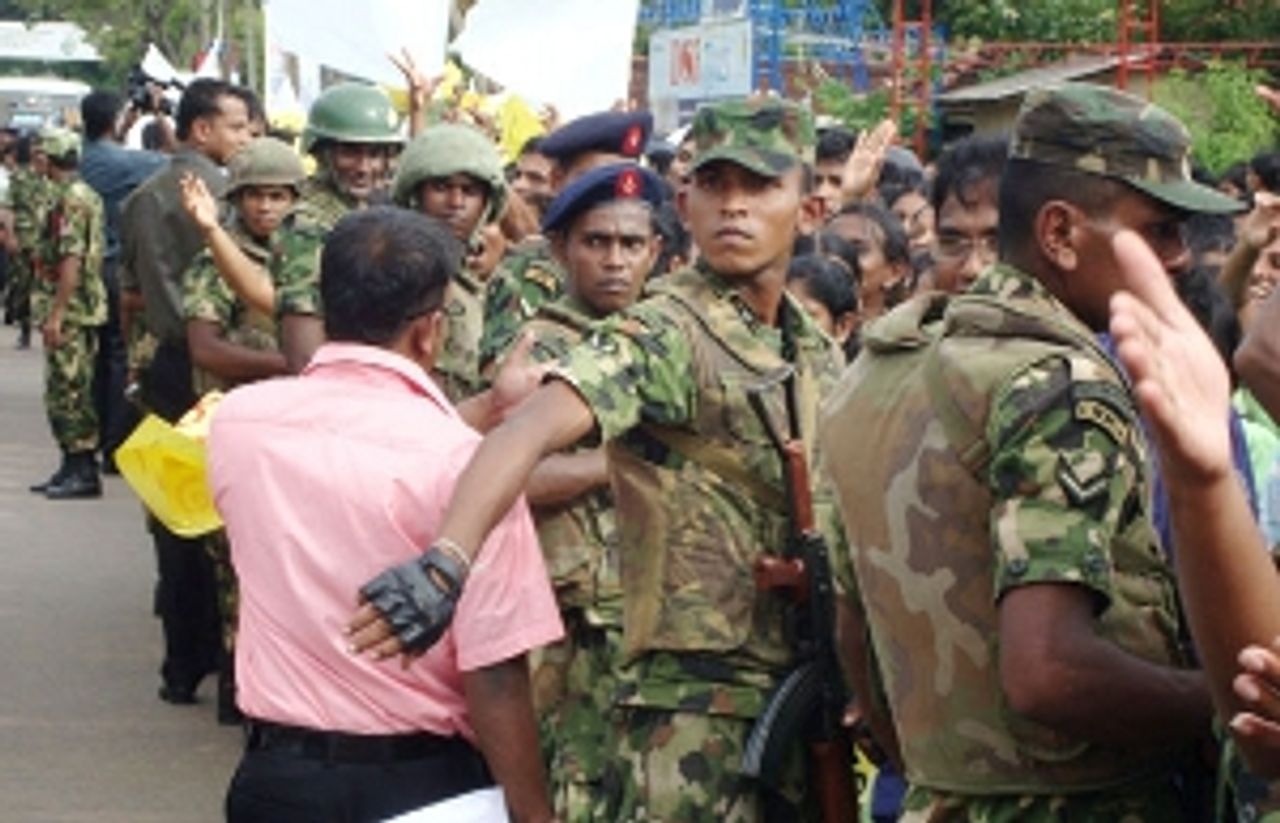 Soldiers push back demonstrators
Soldiers push back demonstratorsResponsibility for Ratnasekera’s death falls squarely on the government, which deployed 2,000 police to suppress any protests. Workers demonstrating outside their factories against a new government pension scheme were violently attacked by police. News spread quickly, prompting a stop work throughout the entire Katunayake FTZ where about 40,000 workers are employed.
FTZ workers have been demanding the withdrawal of the pension legislation, which the government is implementing at the behest of the International Monetary Fund (IMF). The new scheme will force private sector workers to make contributions to pension funds that will provide no significant benefits, especially for FTZ workers.
Ratnasekera was from a poor family in Galoluwa village, Minuwangoda, about 50 kilometres from Colombo. He worked as a machine operator for a steel processing factory.
During the protest, Ratnasekera was hit in the leg by police bullets. According to relatives, he was kept for two hours at the police station without treatment even though he was bleeding profusely. He was later admitted the Ragama Teaching Hospital where he was put into the intensive care unit.
No information has been released as to the cause of death. A report by the Judicial Medical Officer has not been made public. Hospital director Dr. Roy Perera has declined to comment saying he has been ordered not to release any details to the media.
Thousands of workers from the FTZ and the surrounding area have poured into Ratnasekera’s home to pay their respects. Nervous that the funeral could become a focus for public anger, the government has mobilised hundreds of soldiers near the house. Military intelligence officers have also been deployed.
A court order has been issued “requesting” the victim’s parents put restrictions on the funeral scheduled for Saturday. Minuwangoda magistrate K.K.A.V. Swarnadhipathy has ordered the body not to be taken anywhere other than the church where the funeral service is to take place. Only the final rites and a formal speech of appreciation are to be allowed.
The worker’s mother, Kanthi Ratnasekera, told the WSWS: “Now my son has gone. I don’t know who is responsible for this murder. I know the police killed my son. As we haven’t received a JMO report, we don’t know the actual reason for my son’s death. We want all those who did this crime punished.”
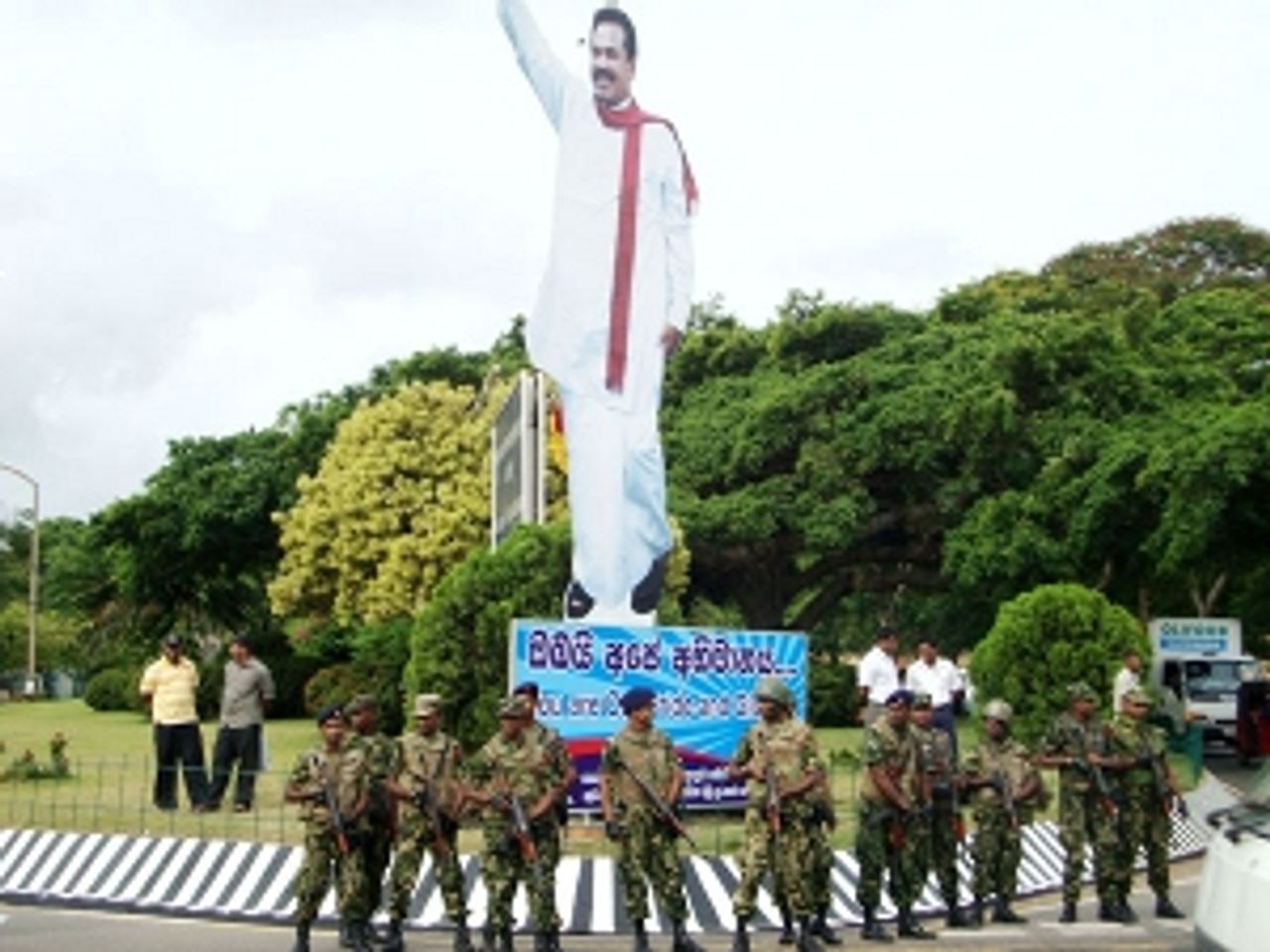 Soldiers in front of Rajapaske billboard near FTZ
Soldiers in front of Rajapaske billboard near FTZA worker from the Hirdarmani company said that the government was trying to put the blame solely on the police. “We reject that,” he said. “[President] Mahinda Rajapakse is the main culprit in this death. The government says that the [opposition] Janatha Vimukthi Peramuna organised this protest. No, we organised the protest without the leadership of any political organisation or union. All the workers in this zone have identified this pension scheme as a fraud.”
The worker added: “Roshen gave his life for our struggle and we all respect him. Today, it’s Roshen and tomorrow it will be me.”
After closing the Katunayake FTZ for two days, the government reopened it yesterday, but, according to the Board of Investment (BOI), only 85 percent of workers returned to work. The area has been converted into a war zone. To intimidate employees, hundreds of soldiers and special police commandos have been deployed around the zone, as well as the roads leading to factories.
Thousands of Brandix workers held a protest yesterday over Ratnasekera’s death. Brandix is a BOI project located just outside the Katunayake FTZ. The Socialist Equality Party (SEP) distributed copies of its statement “Defend Sri Lankan free trade zone workers” at the demonstration.
Advisory council representatives tried to oppose the leaflet, saying workers need no policies, but many protesters took and read it. The FTZ advisory councils have been set up under BOI regulations. Employee representatives, chosen in management-run elections, have close ties to the trade unions, which have opposed protests over the pension scheme.
The government is now desperately seeking to defuse the situation. Spokesman Keheliya Rambukwella has announced that the pension bill has been withdrawn but could be presented again in amended form at a future date.
On Wednesday, Inspector General of Police (IGP) Mahinda Balasuriya took responsibility for the police actions against FTZ workers and retired from his post. In a bid to deflect public anger over Ratnasekera’s death, the police criminal investigation department has arrested two inspectors.
At the same time, the government has gone on the political offensive. Over the past two days, government parliamentarians have held protests in Colombo blaming the opposition JVP for the “violence” in the FTZ. The information department has also issued a statement saying that “disruptive elements” were trying to “destabilise” the government.
The government’s chief target is not the JVP, but the working class. While posturing as an opponent of the pension bill, the JVP has opposed any political struggle against the government. Its main concern is to defend business interests. JVP union leader Wasantha Samarasinghe told the Daily Mirror on Wednesday that the police attack had resulted in millions of rupees of lost production.
The Joint Trade Union Alliance (JTUA), a grouping of 26 public and private sector trade unions, organised a protest in Colombo on Wednesday against police violence. About 1,500 people participated, chanting slogans against the police and the government.
Free Trade Zone and General Services Trade Union leader Anton Marcus boasted that the alliance would force the government to “roll back the pension bill.” If the government did not agree to the union demands, he warned, “We will call all 500,000 FTZ workers onto the streets.”
Health Services Trade Union Alliance leader Saman Ratnapriya declared: “If the government is going to suppress the workers, we are ready to reply it by a general strike.”
Workers should see through this militant phrase-mongering by union leaders. Just last week, the JTUA called off protests against the pension bill, saying that they would disrupt production in the FTZ factories. Workers ignored the unions and protested anyway. Now these leaders are seeking to regain control over workers even as the unions prepare for talks with the government over the pension legislation.
***
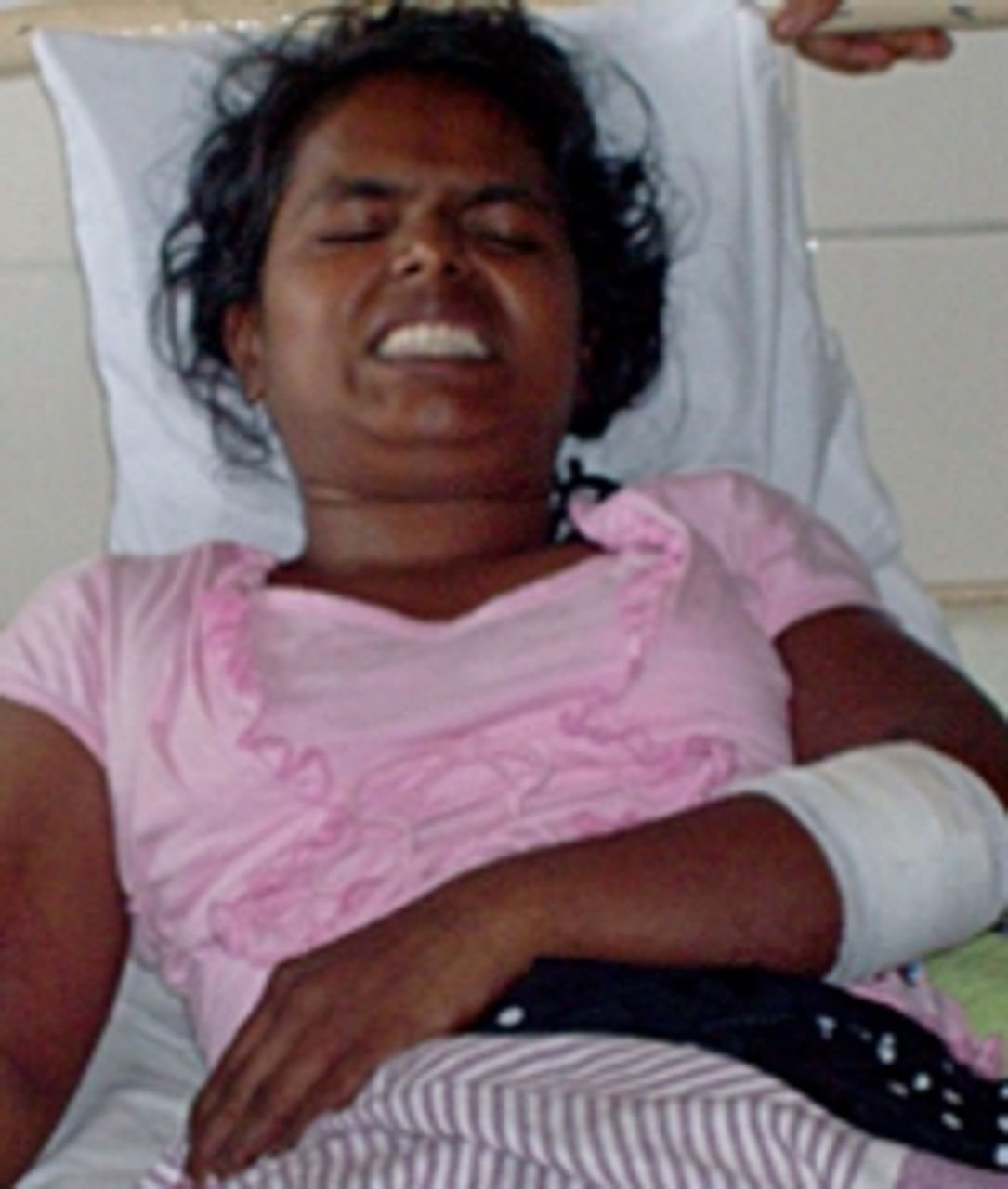 Thamali Iresha
Thamali IreshaThe World Socialist Web Site spoke with several injured workers in Negombo hospital near the Katunayake FTZ.
Thamali Iresha, who has eight stitches to her hand, said: “While we were involved in the agitation, police entered the zone, broke down the main gate and attacked us and damaged the factory. We ran and hid in another factory. I was assaulted with an iron bar and others faced similar attacks. One girl who was with me was attacked with a helmet. She received head injuries and collapsed unconscious. She was then dragged to a police van.”
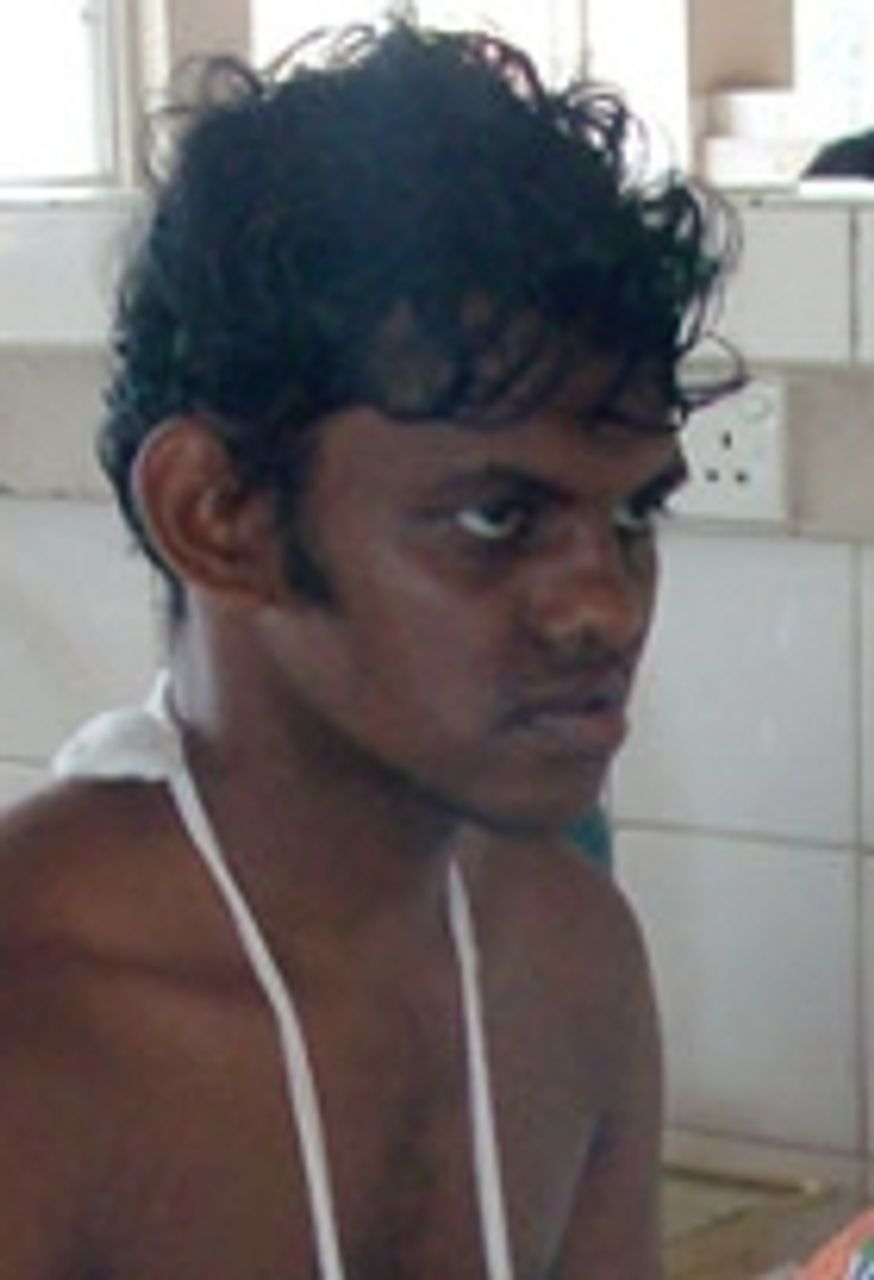 Mangala Sampath
Mangala SampathMangala Sampath was shot during the protests. A bullet went through his thigh and seriously damaged one of his testicles, which was later removed during surgery. Sampath was carried by his colleagues over a wall and, with the assistance of local villagers, taken to Negombo hospital. “If I’d been caught by the police they would have kept me until I bled to death,” he told the WSWS.
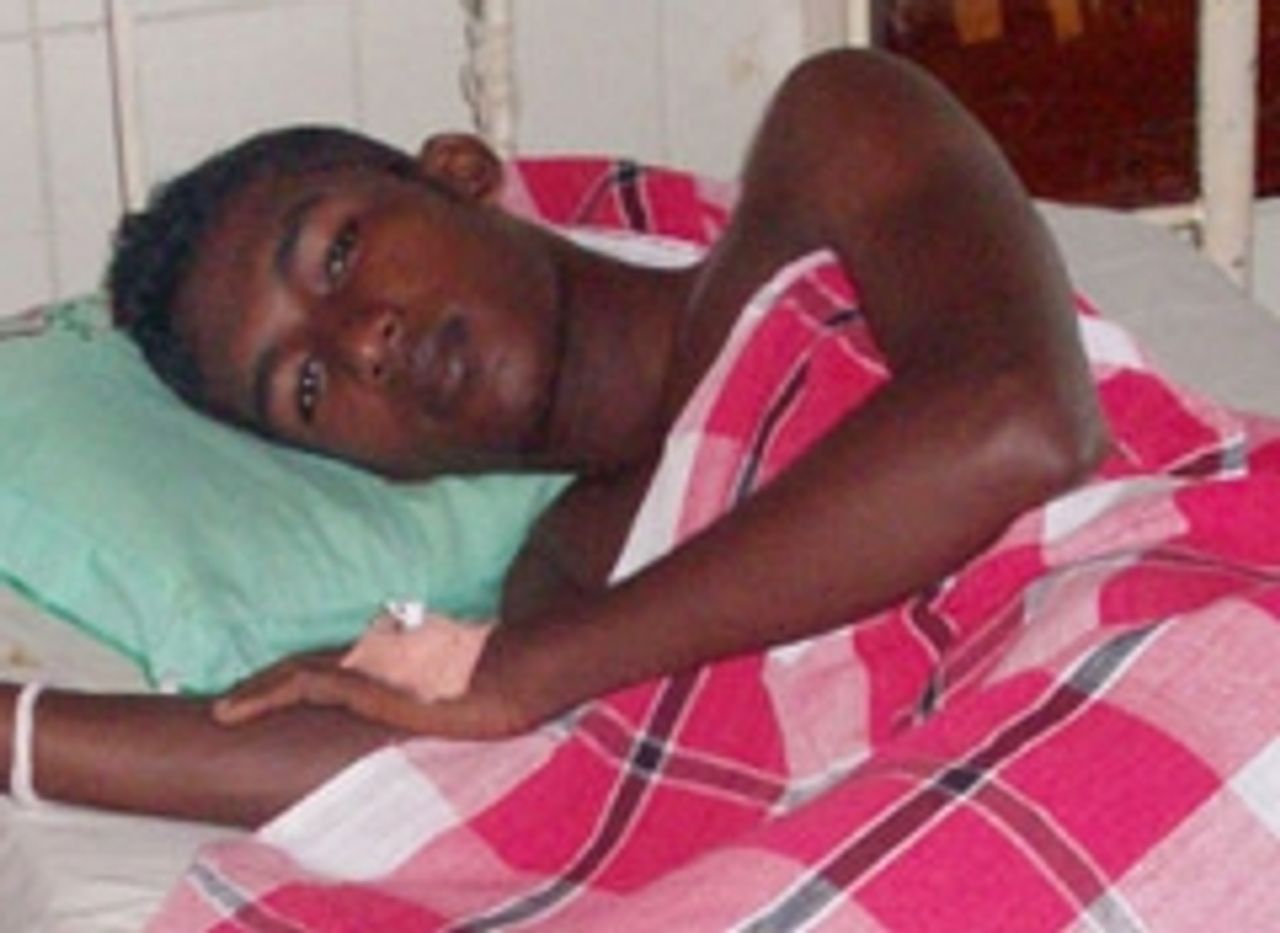 Sumedha Chandimal
Sumedha ChandimalSumedha Chandimal, who has a heart condition, was in a factory sick room when the police assault began. He attempted to hide but the police dragged him out and arrested him. He was held at the police station for more than two hours before being taken to hospital.
